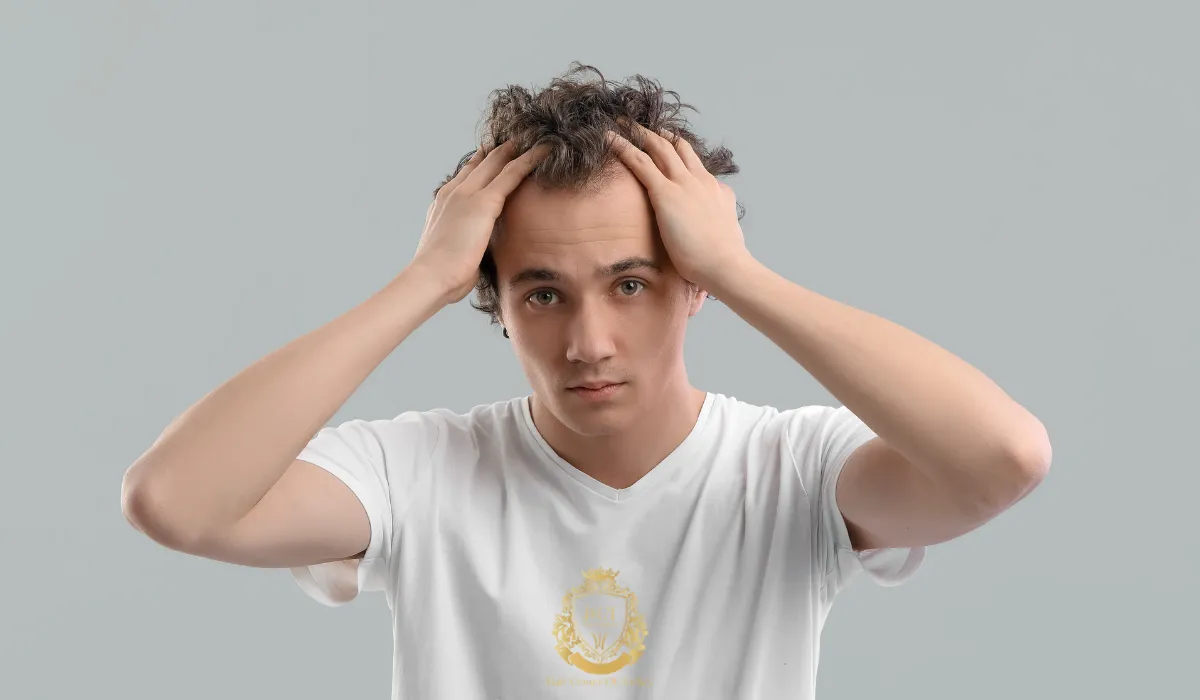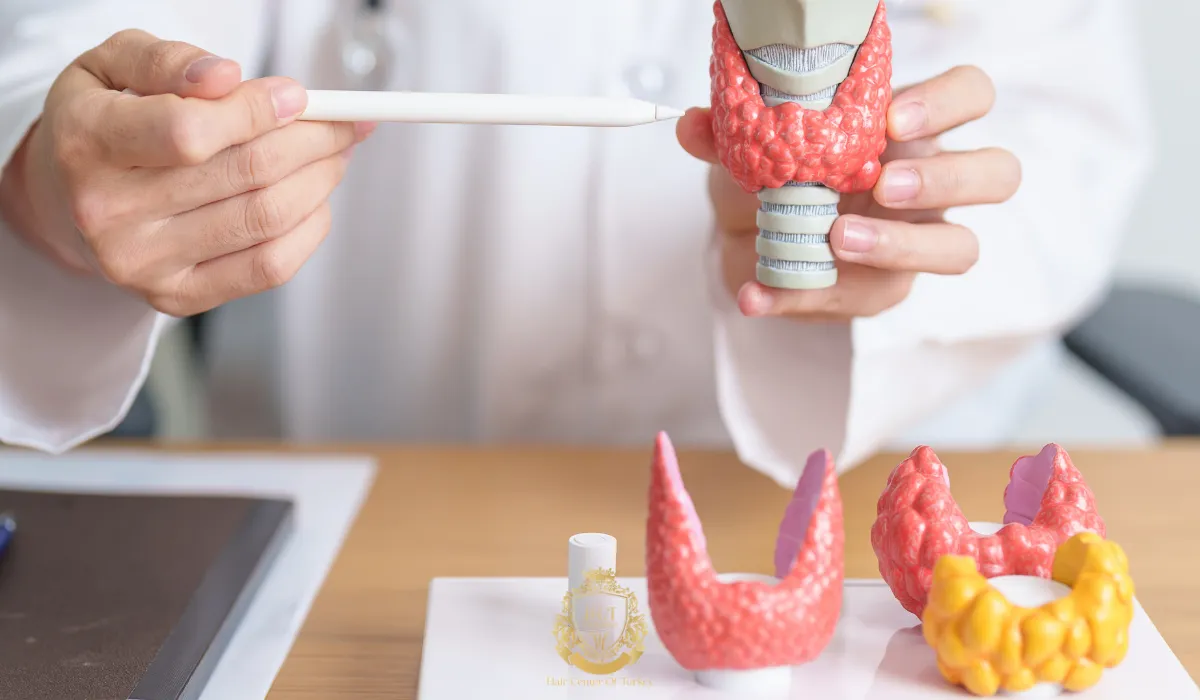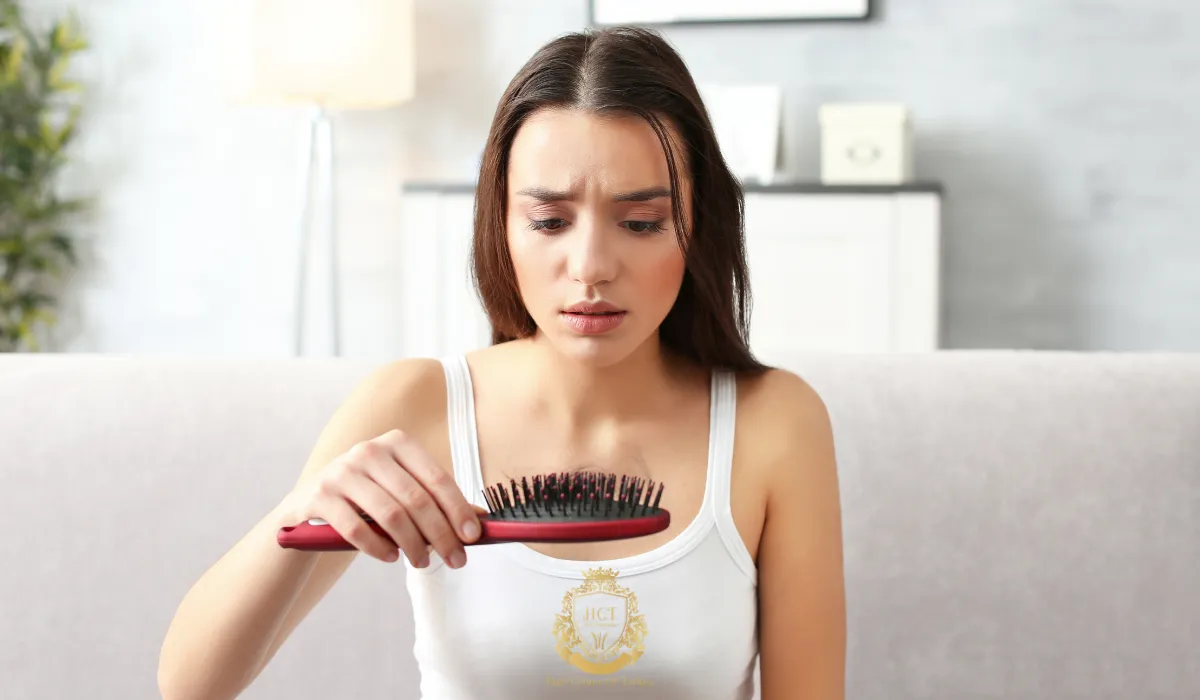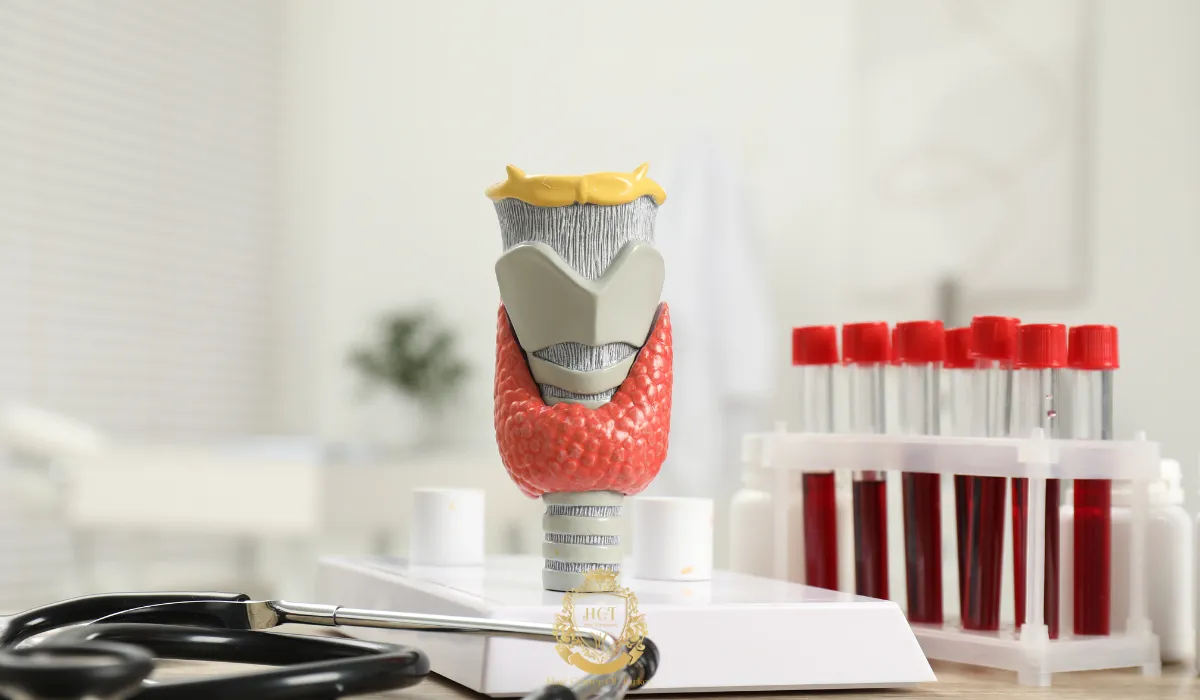
Thyroid And Hair Loss
Severe or long‑standing thyroid imbalance can push more hairs into the shedding phase, causing diffuse thinning across the scalp and sometimes eyebrow loss. Hair often improves once thyroid levels are stabilized, but regrowth takes time—usually months. Because other conditions can mimic thyroid hair loss, a clinician can confirm the cause with blood tests.
Symptoms Of Thyroid-Related Hair Loss
Thyroid-related hair loss usually looks like diffuse thinning rather than a single bald patch. Many people notice their ponytail feels smaller, their part looks wider, or their hairline appears less dense.
In some cases, hair may also thin at the outer third of the eyebrows. Eyelash changes are less common, but can happen when thyroid levels are significantly out of range.
Shedding can be gradual, and it may become more noticeable after a major change in thyroid hormone levels—such as starting or adjusting treatment. This timing can be confusing because hair cycles respond slowly.

Table of Contents
Symptoms Of Thyroid Disease
Hair thinning is rarely the only sign of a thyroid disorder. If you also have symptoms below, it’s worth discussing thyroid testing with a healthcare professional.
Possible symptoms of hypothyroidism (underactive thyroid) include tiredness, feeling cold, dry skin, constipation, slowed heart rate, low mood, and unexplained weight gain.
Possible symptoms of hyperthyroidism (overactive thyroid) include feeling hot, anxiety or irritability, tremor, palpitations, increased sweating, sleep problems, and unexplained weight loss.
Thyroid symptoms can be subtle, overlap with other conditions, and vary by age, pregnancy status, and other health factors. A blood test is the most reliable way to confirm what’s going on.

Causes Of Thyroid Hair Loss
Both hypothyroidism and hyperthyroidism can disrupt the hair growth cycle, especially when the condition is severe or has been untreated for some time. The most common pattern is telogen effluvium—more hairs than usual shift into the resting (shedding) phase.
Many thyroid disorders are autoimmune. Hashimoto’s thyroiditis is a common cause of hypothyroidism, while Graves’ disease is a common cause of hyperthyroidism. Having one autoimmune condition can raise the risk of another.
Alopecia areata is an autoimmune condition that causes well-defined patches of hair loss and occurs more often in people with autoimmune thyroid disease than in the general population. If you see round, smooth patches, a dermatologist can help confirm the diagnosis.

What’s The Connection Between Your Thyroid And Your Hair?
Hair follicles are highly active tissues, and they rely on stable hormone signals to keep growing. Thyroid hormones (T3 and T4) influence how long hairs stay in the growth phase and how quickly they transition to the shedding phase.
When thyroid hormone levels are too low or too high, follicles can “shift gears” prematurely. The result is often widespread thinning across the scalp rather than scarring or permanent follicle damage.
Because hair grows in cycles, changes you make today won’t show up immediately. Many people notice shedding several weeks to a few months after a thyroid flare, a medication change, or another stressor.

Can Thyroid Medication Cause Hair Loss?
Occasionally, people notice increased shedding soon after starting treatment for hypo- or hyperthyroidism. In many cases, this reflects the hair cycle adjusting to changing hormone levels rather than a true medication side effect.
Antithyroid medicines such as carbimazole and propylthiouracil list hair thinning as a possible (usually uncommon) side effect. Even then, it can be hard to separate the effect of the medication from the effects of the underlying thyroid overactivity.
Never stop or change thyroid medication on your own. If shedding is severe or persistent, speak with your prescriber so they can review your dose, lab results, and other possible causes.
How To Reduce Hair Loss If Your Thyroid Is Involved
The goal is to treat the underlying thyroid condition and remove other common triggers of diffuse shedding.

1) Get The Right Tests
Ask your clinician which tests are appropriate for you. Thyroid workups commonly include TSH and free T4, and sometimes free T3 plus thyroid antibodies (such as TPO antibodies) when autoimmune thyroid disease is suspected.
If hair loss is your main concern, clinicians often also look for other drivers of shedding such as low ferritin (iron stores), vitamin D deficiency, low B12, and recent illness, weight loss, or postpartum changes.
2) Give Treatment Time To Work
Even with the right diagnosis and medication, hair recovery is slow. Many people need several months of stable thyroid levels before they see clear regrowth or improved thickness.
If your medication has recently changed, try to avoid judging progress week by week. Photos in consistent lighting and a simple timeline can make trends easier to spot.
3) Support Hair Growth With Basics That Matter
- Prioritize protein at meals if your intake is low or inconsistent.
- Correct iron deficiency if confirmed by testing (don’t self-prescribe iron long-term without labs).
- Avoid “mega-dose” supplements. Some vitamins (such as vitamin A and selenium) can worsen hair loss when taken in excess.
- Be gentle with your hair: minimize tight styles, harsh bleaching, and frequent high-heat styling during heavy shedding.
4) Manage Stress And Scalp Inflammation
Stress doesn’t directly cause thyroid disease, but it can worsen shedding and make symptoms feel more intense. Consistent sleep, movement, and stress management can help you cope while treatment stabilizes.
If you also have itching, scaling, or redness, you may have seborrheic dermatitis or another scalp condition that can add to shedding. Treating the scalp inflammation can improve comfort and may reduce breakage.

Will Hair Loss Due To Thyroid Grow Back?
In many cases, yes—once thyroid levels are brought back into range and maintained, hair often begins to improve. Regrowth typically takes months because each follicle needs to re-enter the growth phase.
Regrowth can be uneven at first, and new hair may feel different in texture. If thinning continues despite stable thyroid labs for several months, ask your clinician to reassess other causes and consider referral to a dermatologist.
FAQ
How do I know if my thyroid is causing hair loss?
Check for hypothyroid symptoms and confirm with TSH/free T4 blood tests.
How do I stop thyroid hair loss?
Optimize thyroid levels with prescribed treatment; expect hair regrowth after several months.
What vitamin helps thyroid hair loss?
Biotin only helps if deficient; correct iron, vitamin D, and B12 deficiencies.
Is thyroid hair loss reversible?
Yes, once thyroid levels normalize, shedding usually improves and regrowth occurs.
What to eat for thyroid hair loss?
Eat adequate protein, iron-rich foods, selenium, zinc, and iodine within recommended limits.




